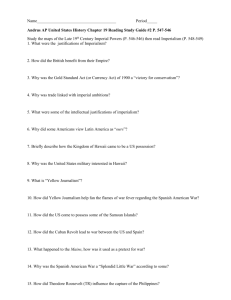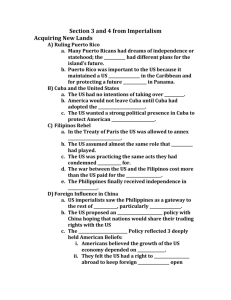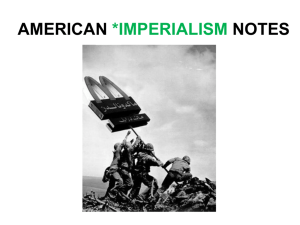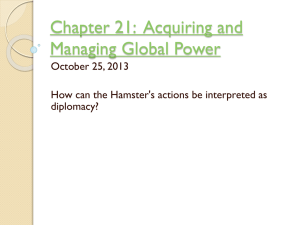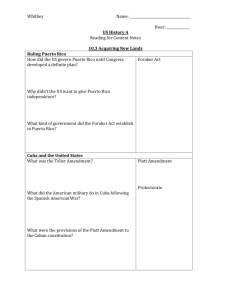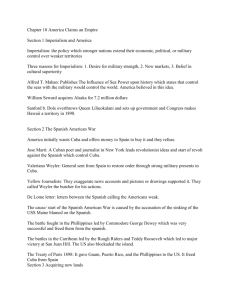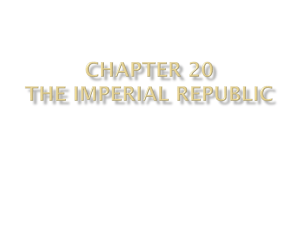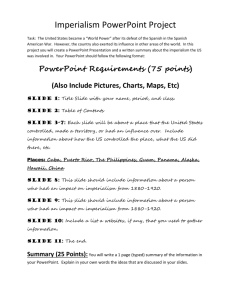Chapter 10 – America Claims an Empire
advertisement
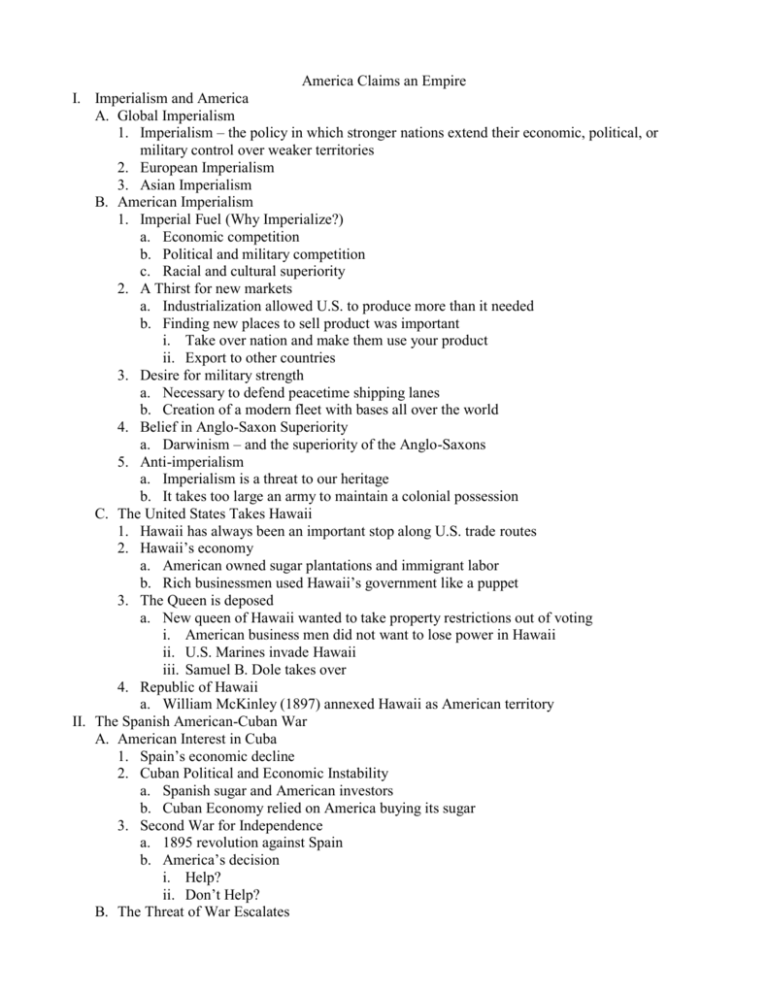
America Claims an Empire I. Imperialism and America A. Global Imperialism 1. Imperialism – the policy in which stronger nations extend their economic, political, or military control over weaker territories 2. European Imperialism 3. Asian Imperialism B. American Imperialism 1. Imperial Fuel (Why Imperialize?) a. Economic competition b. Political and military competition c. Racial and cultural superiority 2. A Thirst for new markets a. Industrialization allowed U.S. to produce more than it needed b. Finding new places to sell product was important i. Take over nation and make them use your product ii. Export to other countries 3. Desire for military strength a. Necessary to defend peacetime shipping lanes b. Creation of a modern fleet with bases all over the world 4. Belief in Anglo-Saxon Superiority a. Darwinism – and the superiority of the Anglo-Saxons 5. Anti-imperialism a. Imperialism is a threat to our heritage b. It takes too large an army to maintain a colonial possession C. The United States Takes Hawaii 1. Hawaii has always been an important stop along U.S. trade routes 2. Hawaii’s economy a. American owned sugar plantations and immigrant labor b. Rich businessmen used Hawaii’s government like a puppet 3. The Queen is deposed a. New queen of Hawaii wanted to take property restrictions out of voting i. American business men did not want to lose power in Hawaii ii. U.S. Marines invade Hawaii iii. Samuel B. Dole takes over 4. Republic of Hawaii a. William McKinley (1897) annexed Hawaii as American territory II. The Spanish American-Cuban War A. American Interest in Cuba 1. Spain’s economic decline 2. Cuban Political and Economic Instability a. Spanish sugar and American investors b. Cuban Economy relied on America buying its sugar 3. Second War for Independence a. 1895 revolution against Spain b. America’s decision i. Help? ii. Don’t Help? B. The Threat of War Escalates 1. Spanish Concentration Camps a. Valeriano Weyler – Spanish leader who sent Cubans to concentration camps to stop a rebellion 2. Yellow Journalism a. Reporting that exaggerates the news to lure new readers 3. The De Lome Letter a. Letter criticizing President McKinley i. American Backlash 4. The U.S.S. Maine Explodes a. Unexplained – Was Spain at fault? C. War Breaks Out 1. U.S. goes to war with Spain after the Maine 2. The Philippines a. First battles of Spanish War b. Only two months before Spanish surrendered to Americans 3. U.S. Forces Invade Cuba a. U.S. navy encircled Cuba and Spanish Navy cutting them off from supplies i. U.S. army was not prepared to invade Cuba 4. Rough Riders a. Volunteer cavalry under the command of Theodore Roosevelt b. San Juan Hill i. Led to the eventual decline of Spanish Army ii. American newspapers declared T.R. hero of San Juan Hill 5. Treaty of Paris of 1898 a. Cuba would become independent b. Spain would give Puerto Rico and Pacific island of Guam to the United States c. The United States would pay Spain $20 million for the annexation of the Philippine Islands 6. Annexation of the Philippines a. Imperialism in the Philippines b. Arguments for annexation i. Uplift the Filipinos and Christinize them c. Arguments against i. Settle race relations at home before trying to expand ii. Denying self-government violated Declaration of Independence iii. Competition for American Jobs d. Senate approved the Treaty of Paris in 1899 III. Acquiring New Lands A. U.S. Involvement in Puerto Rico 1. Puerto Rico was controlled by Spanish before Spanish American War 2. American in Puerto Rico a. American’s believed they were there to help the Puerto Ricans 3. Puerto Rican attitudes toward independence a. Some Puerto Rican’s wanted self government b. Others wanted to become U.S. State 4. Citizenship for Puerto Ricans a. U.S. saw Puerto Rico as strategic military presence in Caribbean and would lead the U.S. to Panama b. U.S. granted Puerto Rico commonwealth status i. Foraker Act ii. People of Puerto Rico are U.S. citizens, but Puerto Rico is no a U.S. State B. Cuba Become Protectorate 1. U.S. controlled Cuba militarily until 1900 2. Platt Amendment a. Cubans created government and constitution in 1900 b. Americans wanted Platt Amendment as part of Constitution i. Ensured Cubans would not make treaties that would hurt the U.S. c. Protectorate i. A country whose affairs are partially controlled by a stronger power 3. Protecting American Business Interests a. Sugar, tobacco, mining b. Guantanamo Bay i. Military base on the Southeast coast of Cuba established to ensure American military foothold in the Caribbean ii. Fidel Castro did not revolt against the Americans until the 1950s iii. Still exists today, and is only American military base in a Communist controlled country iv. America still sends checks to Cuba, leasing the land the military base sits on (Castro does not cash the checks) C. Filipinos Rebel 1. Led by Emilio Aguinaldo, Filipinos tried to rebel in late 1800’s 2. Philippine – American War a. Americans squashed the rebellion 3. Aftermath of the war a. U.S. set up government for Philippines similar to one set up in Puerto Rico b. U.S. wanted to maintain military support in Far East c. Philippine became independent in 1946 (after WWII) D. China and the Open Door Policy 1. U.S. imperialists saw the Philippines as a gateway to the rest of Asia a. Did not want war, but wanted market for American products 2. John Hay’s Open Door Notes a. France, Germany, Britain, Japan, and Russia each had trading posts along Chinese coasts i. Created “Spheres of Influence” – rights to railroad construction and mining in China’s interior b. U.S. did not want to colonize China, just have business there c. Open Door Policy i. Open access to Chinese ports for all competing nations ii. Attempting to keep other nations from creating war and colonizing China 3. Rebellion in China a. Boxers i. Secret Chinese society that tried to keep “foreign devils” out b. Boxer Rebellion i. Unified military strategy to stop Boxers from killing international merchants c. Importance of Open door from U.S. perspective i. Growth of U.S. economy depended on export ii. U.S. should have right to intervene abroad to keep foreign markets open iii. Closing of markets threatened U.S E. Impact of U.S. Territorial Gains 1. Justifying U.S. Imperialism a. Enriched population of U.S. and colonized countries b. Trading partners 2. Opposing imperialism a. Racial complexes b. Cost too much to run another country IV. America as a World Power A. A. Teddy Roosevelt and the World 1. Russo-Japanese War 2. Roosevelt the Peacemaker 3. Relations with Japan a. Roosevelt had good relations with Japan b. Shared idea’s about the “Great White Fleet” with Japan 4. Panama Canal a. Canal would proved shortcut between Atlantic and Pacific oceans b. Panama was controlled by Columbia i. U.S. persuaded Panamanians to revolt against Columbia when talks over the canal land broke down ii. U.S. sent battle ships to help people of Panama 5. The Roosevelt Corollary a. Big Stick Diplomacy i. Swatting European countries away from Latin America with a big stick ii. Roosevelt Corollary Addition to Monroe Doctrine Disorder in the LA by European powers might “force the U.S. to exercise international police power” b. Dollar diplomacy i. Policy enacted after Roosevelt left presidency ii. Lending money to LA countries to keep Europe out 6. The Mexican Revolution a. Mexico was in a state of turmoil with revolutions against dictators and reformer leaders 7. Pershing Pursues Villa a. Francisco “Pancho” Villa i. Leader of revolutionary movement against U.S. accepted president ii. Killed American soldiers and citizens attempting to mine in Mexico b. President Wilson sends General John J. Pershing into Mexico to find Villa i. Troops were never able to capture Villa c. U.S. pressure ended with Mexican Constitution in 1917 d. Mexico serves as model for U.S. imperialism i. Americans believed in their superiority politically and economically ii. Attempted to extend their reach through military actions
